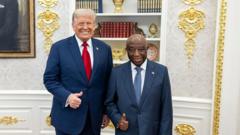In a move reflecting the complex intersection of politics and business, Vietnam has approved a Trump family golf project while overlooking its own laws, stimulating a debate on sovereignty and foreign influence amid pending trade negotiations with the United States.
Vietnam's Controversial Approval of Trump Golf Project Sparks Debate

Vietnam's Controversial Approval of Trump Golf Project Sparks Debate
Amid President Trump's business ventures, Vietnam bypasses its own regulations to fast-track a $1.5 billion golf resort linked to the Trump family, raising legal and ethical concerns.
In a development that highlights the significant overlap between the political landscape and business ventures of the Trump family, Vietnam has opted to expedite the approval of a $1.5 billion golf complex tied to the Trump Organization. Officials in the province where the project is based have reportedly coerced locals to consent to plans that threaten long-standing farmland and cultural sites, with one resident expressing an overwhelming sense of helplessness against the political machinery at work.
The golf complex, located near Hanoi, along with a proposed Trump skyscraper in Ho Chi Minh City, marks the family's first investments in Vietnam. Legal analysts argue that the Vietnamese government has ignored its own regulatory framework to facilitate the project, with government correspondence indicating it has received special consideration due to its close ties to President Trump and his administration.
Vietnam is currently under pressure to negotiate trade agreements with the United States to mitigate potential tariffs proposed by President Trump, which could significantly affect the country’s economy. Vietnamese officials have recognized the implications of these diplomatic relations, stating the need for enhanced cooperation with the Trump administration as crucial for future trade opportunities.
This situation raises pressing questions about national sovereignty, ethical governance, and the implications of political influence on commercial endeavors. As countries navigate the new terrain of international relations shaped by personal business interests, the ultimate impact on domestic populations, like that of Le Van Truong, remains a critical concern.




















